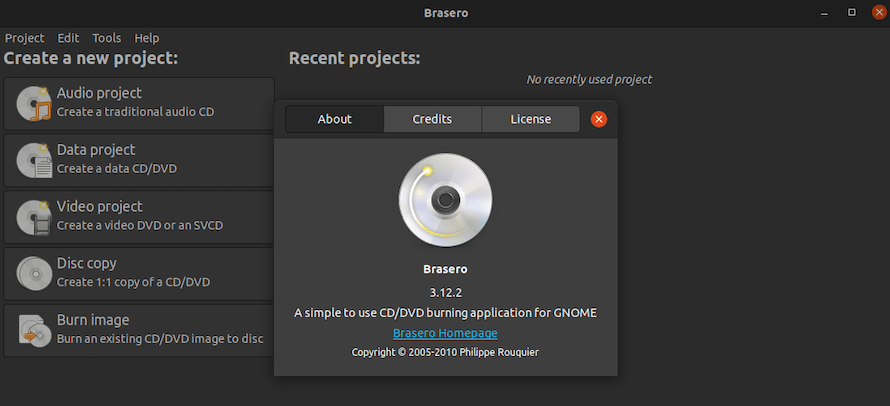How To Install Brasero on Linux Mint 22

In the ever-evolving world of digital media, having a reliable disc burning application is still essential for many users. Brasero, a powerful and user-friendly disc burning software, remains a popular choice for Linux users. This comprehensive guide will walk you through the process of installing Brasero on Linux Mint 22, exploring its features, and providing tips for optimal usage.
Understanding Brasero
Brasero is an open-source application designed specifically for GNOME-based Linux distributions. It offers a wide range of disc burning capabilities, making it a go-to choice for users who need to create data discs, audio CDs, or even video DVDs. Let’s delve into some of Brasero’s key features:
- Data disc creation with support for CD and DVD formats
- Audio CD burning with automatic track splitting and CD-TEXT support
- Video DVD authoring capabilities
- Disc copying and image creation
- Multi-session support for data discs
- File integrity checking to ensure error-free burns
- Intuitive drag-and-drop interface for easy project management
These features make Brasero a versatile tool for various disc burning needs, from backing up important data to creating custom music compilations.
Pre-Installation Steps
Before we dive into the installation process, it’s crucial to ensure your Linux Mint 22 system is up-to-date and ready for the new software. Follow these steps to prepare your system:
1. Update Your System Packages
Open a terminal window and run the following commands:
sudo apt update
sudo apt upgradeThis will ensure all your existing packages are up-to-date, reducing the likelihood of conflicts during the Brasero installation.
2. Check DVD Burning Capability
Verify that your system supports DVD burning by running this command:
cat /proc/sys/dev/cdrom/infoLook for the line “Can write DVD-R” in the output. If it shows “1”, your system supports DVD writing.
3. Verify System Compatibility
Brasero is compatible with most modern Linux distributions, including Linux Mint 22. However, it’s always a good idea to check the official Brasero website or the Linux Mint forums for any known compatibility issues.
Installation Methods
Linux Mint 22 offers multiple ways to install software. We’ll cover two primary methods for installing Brasero: using the terminal and using the Software Manager.
Method 1: Terminal Installation
For users comfortable with the command line, installing Brasero via terminal is quick and straightforward:
- Open a terminal window
- Run the following command:
sudo apt install brasero - Enter your password when prompted
- Confirm the installation by typing ‘Y’ when asked
The terminal will display the progress of the installation. Once complete, Brasero will be ready to use.
Method 2: Software Manager Installation
For those who prefer a graphical interface:
- Open the Software Manager from the application menu
- In the search bar, type “Brasero”
- Click on the Brasero icon in the search results
- Click the “Install” button
- Enter your password if prompted
The Software Manager will handle the download and installation process automatically.
Troubleshooting Common Installation Issues
If you encounter any issues during installation, try these troubleshooting steps:
- Ensure your internet connection is stable
- Clear the APT cache by running:
sudo apt clean - Check for conflicting software that might interfere with Brasero
- Verify that you have sufficient disk space for the installation
Core Features and Functionality
Now that Brasero is installed, let’s explore its core features and how to use them effectively:
Data Disc Burning
To create a data disc:
- Launch Brasero and select “Data project”
- Drag and drop files into the project window
- Insert a blank disc and click “Burn”
- Choose your burning options and click “Burn” again to start the process
Audio CD Creation
For creating audio CDs:
- Select “Audio project” from the main menu
- Add audio files to the project
- Arrange the track order as desired
- Insert a blank CD and click “Burn”
DVD Burning Capabilities
Brasero supports burning data DVDs and creating video DVDs:
- For data DVDs, follow the same process as data CDs, but use a blank DVD
- For video DVDs, use the “Video project” option and add your video files
ISO Image Handling
To burn or create ISO images:
- To burn an ISO, select “Burn image” and choose your ISO file
- To create an ISO, use the “Disc copy” option and select “Create image”
Disc Copying Features
Brasero makes disc copying simple:
- Insert the disc you want to copy
- Choose “Disc copy” from the main menu
- Select your source and destination drives
- Click “Copy” to begin the process
Post-Installation Configuration
After installation, take some time to configure Brasero for optimal performance:
First-Time Setup
When you first launch Brasero, it may prompt you to install additional codecs for full functionality. Follow the prompts to ensure you have all necessary components.

Interface Customization
Brasero’s interface can be customized to suit your preferences:
- Go to “Edit” > “Preferences” to access customization options
- Adjust the toolbar layout, file browser view, and temporary file location
Setting Default Preferences
Configure your default burning preferences:
- Set your preferred burning speed
- Choose whether to automatically eject discs after burning
- Enable or disable file integrity checking
Integration with System
Brasero integrates well with the Linux Mint desktop environment. You can right-click on ISO files to burn them directly or add Brasero to your list of preferred applications for handling optical discs.
Using Brasero Effectively: Tips and Tricks
To get the most out of Brasero, consider these tips:
Project Creation Workflow
Develop an efficient workflow:
- Plan your project structure before adding files
- Use the “Save project” feature for complex or recurring projects
- Take advantage of Brasero’s ability to add files from multiple sources
File Management
Manage your files effectively within Brasero:
- Use the built-in file browser to navigate your system
- Create folders within your project to organize files
- Use the search function to quickly locate specific files
Burning Options and Settings
Explore advanced burning options:
- Experiment with different burning speeds to find the optimal balance between speed and quality
- Use the “Burn several copies” option for batch burning
- Enable the “Simulate before burning” option to test your project without wasting a disc
Quality Checks and Verification
Ensure the quality of your burns:
- Always use the “Check integrity” option after burning important data
- For audio projects, use the preview function to check track transitions
- Regularly clean your optical drive to maintain burn quality
Maintenance and Updates: Keeping Brasero in Top Shape
To ensure Brasero continues to perform optimally:
Keeping Brasero Updated
Regularly update Brasero along with your system:
sudo apt update
sudo apt upgradeThis will update Brasero along with other system packages.
Managing Dependencies
Brasero relies on various libraries and codecs. Keep these updated:
sudo apt install ubuntu-restricted-extrasThis package includes many common codecs and libraries that Brasero may use.
Troubleshooting Common Issues
If you encounter problems:
- Check the Brasero log files for error messages
- Verify that your optical drive is functioning correctly
- Ensure you’re using high-quality, compatible discs
- Consider reinstalling Brasero if persistent issues occur
Congratulations! You have successfully installed Brasero. Thanks for using this tutorial to install the latest version of the Brasero disc burning on Linux Mint 22. For additional help or useful information, we recommend you check the official Brasero website.